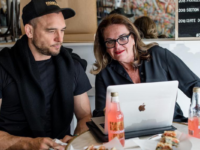When Sherel Schnyder dreamt up Australia’s first convertible high heel, she had no idea of the manufacturing challenges she would face before she could bring the product to market.
High heels had always been a source of empowerment and confidence for Sherel, and Lobo’s convertible shoe came from a desire to balance fashion with practicality.
“Racing around the city for meetings, I often faced the dilemma of choosing between fashion and comfort, or having to carry a spare pair of shoes,” Sherel says.
Convertible heels were a market-first in Australia. This meant the product had to be designed from scratch – the first hurdle, Sherel says. The challenge was designing a sole that could accommodate the differences in foot posture between heels and flats.
“The challenge was finding the right balance,” Sherel explains. “If the sole was too flexible, it would snap; too rigid, and it wouldn’t support the arch.”
Sherel opted to manufacture her shoes in Europe – she says the craftsmanship there is renowned for its quality. Unfortunately, she found that European machinery was not as advanced as what was available closer to home, in China. Many of the European manufacturers that Sherel approached told her that her idea was “impossible”, or even “going against fashion”.
Moreover, Sherel was confronted by vast cultural differences with the overseas manufacturers. She says she worked with factories in Italy, Spain, Portugal and Turkey – all of whom had different approaches to work, scheduling and communication. The entrepreneur also met her fair share of male-dominated factories, where there was little respect for women.
“The language barrier was one thing, but the cultural differences were even more daunting,” Sherel says. “It was the polar opposite of how we do business in Australia.”
As if cultural differences and the logistical challenges of creating a brand-new product weren’t enough, Sherel describes facing further barriers while finding a manufacturer for Lobo. Firstly, travel became restricted during the COVID-19 pandemic. Secondly, the entrepreneur was scammed by agents who falsely claimed to have a factory. It wasn’t until she flew over to meet them, Sherel says, that she realised the factory did not exist.
Despite the myriad setbacks, Sherel eventually launched Lobo this year. When asked how she overcame her original issues designing the shoe, Sherel says that perseverance was key. Together with Australian engineers and the European factories’ input, she worked on “countless” iterations of her market-first heel over three-and-a-half years. The cost of development was steep. Each prototype cost anywhere from $50,000 in tooling, Sherel says. She relied on a mixture of R&D grants and selling her belongings to bootstrap the business. After what Sherel described as many failed attempts, she and her team developed their own innovative sole, which they’ve now patented.
Overcoming the cultural barriers between herself and the European manufacturers was a similarly difficult task, Sherel recounts.
“I had to lean into the culture instead of resisting it and letting frustration take over,” she explains.
Sherel worked hard to nurture her relationships with her Portuguese manufacturers. She quit her job and moved to Portugal, learnt to love local food and drink, and even pretended to take up smoking to get quality time with the factory owner multiple times a day. Over time, she gained respect.
“These people quickly became family, and Lobo started to accelerate as a result,” Sherel says.
When asked what advice she would give to other entrepreneurs launching an unconventional product, Sherel recommends tuning out the naysayers.
“If your gut and heart are on fire telling you something must be done, don’t let anyone convince you otherwise,” she says.
Instead, work with people you trust, who believe in your idea, or who have walked a similar path, Sherel says. Avoid agencies, she adds. Instead, bring in freelancers or internal help as soon as possible – experts if possible. The entrepreneur also highlights the importance of fostering your own passion for your product – this helped her get investors on board and raise capital.
“Forget about rigid timelines, and if you think you know the amount you need to start, expect it to take much more,” Sherel says. “If we had known how hard it would be, we might never have begun – so just start, and enjoy the journey.”
This article first appeared in issue 46 of the Inside Small Business quarterly magazine















